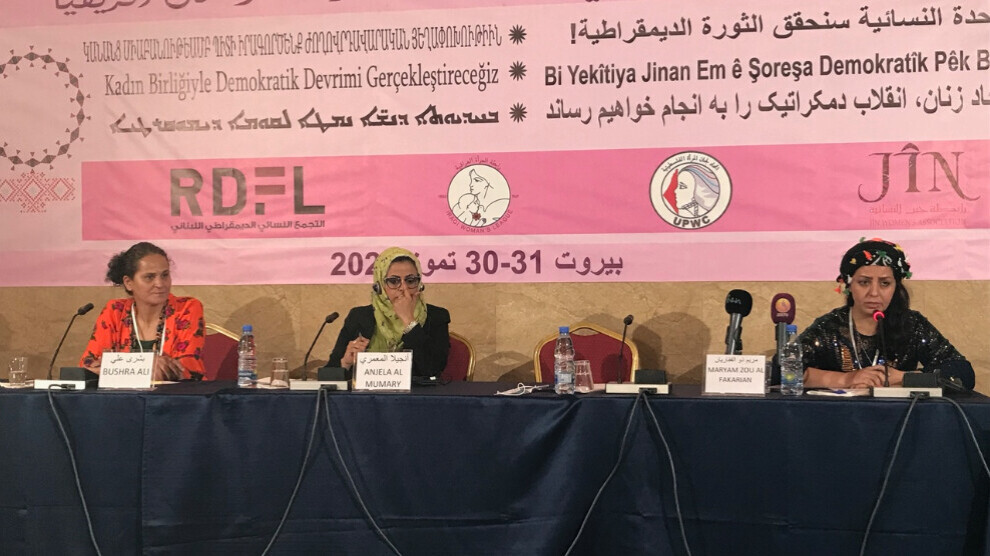2nd Middle East Women's Conference kicks off in Beirut
The 2nd Middle East Women's Conference has started in Beirut under the motto “We Will Achieve a Democratic Revolution through the Union of Women”.
The 2nd Middle East Women's Conference has started in Beirut under the motto “We Will Achieve a Democratic Revolution through the Union of Women”.

The 2nd Middle East Women's Conference has commenced in Beirut with more than 100 delegates from several countries of the Middle East and North Africa. The situation in the Middle East, the experiences of women in the region and their common principles will be discussed at a 2-days conference.
The women’s conference, the first of which had been held in Amed in 2013, started this morning with messages. The Community of the Women from Kurdistan (KJK), Patriotic Union of Kurdistan’s women's branch Yekitiya Jinani Kurdistan, Êzidxan Women's Freedom Movement (TAJÊ) from Shengal and jailed politician Leyla Güven on behalf of political prisoners in Turkish prisons sent messages to the conference, where Hanan Osman delivered the opening speech on behalf of the Preparatory Committee.
CONFLICTS AND THE ROLE OF WOMEN
In the first session of the conference, the current crises and the role of women in the Middle East and North Africa were discussed. The speakers of the first session, moderated by Anjela Al Mumary from Yemen were Büşra Ali from Jinn Women's Institution in Lebanon, Meryem Zolfagharianaliabad from Iran, Hatice Riyadi from Morocco and Lina Bereket from North and East Syria.
Büşra Ali pointed to the Third World War between the global capitalist powers and the regional states in her speech titled “Contradictions-conflicts and our role in the last 10 years”. Ali underlined the social struggles led by women as the third dynamic. She emphasized that results can be achieved if the women's freedom struggle leads the social freedom struggle in the region.
'ORGANIZATIONAL EFFORTS IN IRAN'
Meryem Zolfagharia, a women's rights defender from Iran, delivered a speech on “Nation-state and the power in the region” in which she discussed the effects of sexism, religionism and nationalism. Zolfagharia spoke about the prevalence of forced marriages at a young age, adding that the minimum age is 13 to get married in Iran. Zolfagharia emphasized the heavy pressures against women activists and drew attention to the situation of political prisoner Zeynep Celaliyan. Zolfagharia also stated that although women's participation was broad before the Islamic Revolution in Iran, they were not organized, but currently women in Iran have significant organizational skills.
'RAPE UNDER DETENTION AS A TORTURE METHOD'
Lina Bereket from the Syrian Women's Council addressed the effects of war and conflicts over women. Noting that women in Syria are faced with various forms of violence, Bereket said that there has been a serious increase in violence against women. Bereket stated that rape under detention is used as a tool of oppression and torture, and that religious arguments are used for prostitution. Bereket stressed that documenting cases of violence against women in Syria is difficult and shared some statistics. According to the data, approximately 40 percent of Syrian refugees are women. A quarter of refugee women take care of their children alone, which leads to an increase in early marriages.
The conference continues with the session titled "Women's struggle experiences in the Middle East and North Africa". The session moderated by Egyptian journalist Nour El Hoda Zaki is attended by HDP lawmaker Gulistan Koçyiğit from Turkey and Northern Kurdistan, Heyat Mirşad from Lebanon, İman al Hüseyin from Jordan and Şamiran Odesho from Iraq.
Organized women from Lebanon, the four parts of Kurdistan, Turkey, Iraq, Iran, Syria, Egypt, Yemen, Tunisia, Sudan, Afghanistan, Jordan, Libya, Morocco and Palestine are participating in the conference.